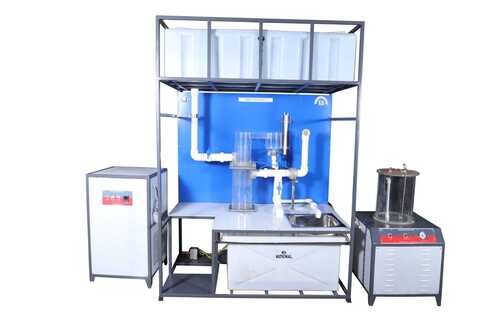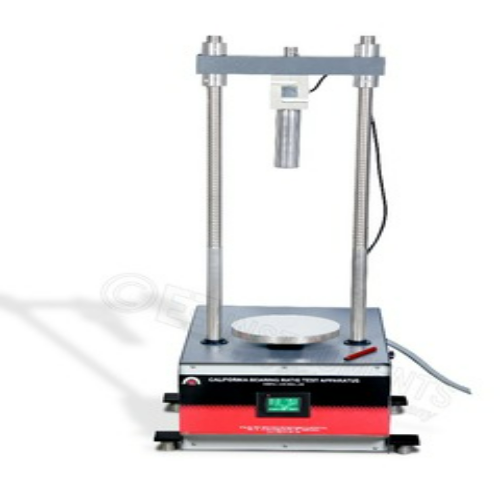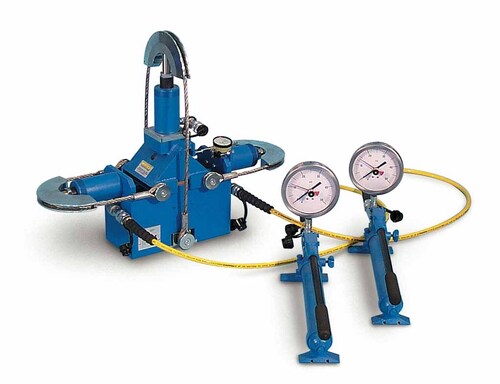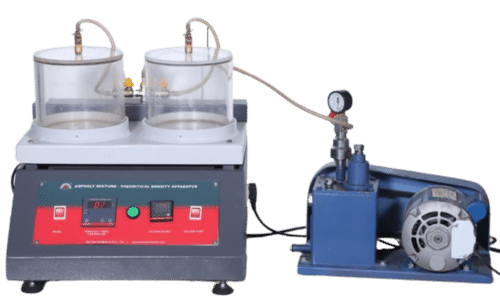Geotextile Universal Testing Machine
Geotextile Universal Testing Machine Specification
- Automation Grade
- Semi Automatic
- Frequency
- 50-60 Hertz (HZ)
- Product Type
- Geotextile Universal Testing Machine
- Power Supply
- 230 Volts, 50 Hz, Single Phase, AC Supply
- Usage
- Civil Engineering Testing Equipment
- Features
- Accurate results, Robust construction, Efficient working
- Voltage
- 230 Volt (v)
- Application
- Geo-synthetic material including Geo-textile, Composite Geo-textile, Geo-grid, Geo-membrane, Geo-Net etc. Which are used in traffic, water conservancy, tunnel, building construction and other industries.
- Operate Method
- Electric
- Control Mode
- Touch screen HMI & PLC Controller
Geotextile Universal Testing Machine Trade Information
- Minimum Order Quantity
- 1 Number
- Supply Ability
- 100 Per Month
- Delivery Time
- 4 Week
- Sample Policy
- Contact us for information regarding our sample policy
- Packaging Details
- Wooden Box / Corrugated Box
- Certifications
- ISO 9001 : 2015
About Geotextile Universal Testing Machine
Applications:
- Geo-synthetic material including Geo-textile, Composite Geo-textile, Geo-grid, Geo-membrane, Geo-Net etc. Which are used in traffic, water conservancy, tunnel, building construction and other industries.
-
- Suitable to conduct Grab, Static Puncture (CBR Puncture), Index puncture, Trapezoid Tear and wide width tensile tests confirming to procedure laid down in above listed ASTM Standards
Specifications of Dedicated Software:
- RS 232 interface with WINDOWS based software to conduct test and keep record of generated data with Graphical Representation
- Also, keep record of generated resultsi.e. Yield Load, Yield Extension, Break Load, Break Extension, and Modulus of Elasticity
- Line, Doted line, etc facility in graph
- Graph Grids color combination facility
- Graph zooming facility
- Individual graph comparison facility
- Graph overlapping facility for analysis of material property
- Auto scaling facility
- Company logo insertion facility
- Software can run various tests and can recall data for any test done in history. (If Saved)
- Software is Menu Driven for easy navigation through tests.
- Test reports and graphs directly printed on terminal printer through direct print commands after the test is completed.
- Data and Result Units Selectable
- User can operate the machine directly from the software itself
- User can export the generated data in various file formats such as i.e. Excel, PDF etc
- Large Storage capacity (More than 50,000 tests) Depending upon Hard Disk capacity.
Further details availableon our website.
The Price mentioned here are subject to change as per the capacity,specifications and application of the user.
Advanced Control and Precision
The machine employs a touch screen HMI and PLC Controller, combining ease of operation with precise control of all testing parameters. This modern interface simplifies the process, resulting in consistent and accurate results for a variety of geo-synthetic materials suitable for construction, water conservancy, and more.
Versatile Applications in Civil Engineering
Engineered for testing diverse geo-synthetic products, this equipment serves multiple industries including road construction, tunnels, water conservation, and building foundations. Its adaptability ensures reliable performance across different material types, making it an essential tool for quality assurance in civil engineering projects.
FAQs of Geotextile Universal Testing Machine:
Q: How does the Geotextile Universal Testing Machine operate?
A: This testing machine uses a 230 Volt, 50 Hz, single-phase AC power supply. Controlled via a touch screen HMI combined with a PLC Controller, it provides an intuitive operation and programmable testing cycles for various geo-synthetic materials.Q: What types of materials can be tested with this machine?
A: The device is designed for geo-synthetic materials, including geo-textiles, composite geo-textiles, geo-grids, geo-membranes, and geo-nets, which are commonly used in civil engineering and construction industries.Q: When is it necessary to use a Geotextile Universal Testing Machine?
A: The equipment is essential during quality assurance and research phases in construction, infrastructure development, and water management projects. It ensures that geo-synthetic materials comply with established safety and performance standards before use.Q: Where can this equipment be utilized?
A: The machine is widely deployed in laboratories, research facilities, construction sites, and material testing centers associated with civil engineering projects across India and internationally.Q: What is the process for testing geo-synthetic materials?
A: Materials are placed in the machine, and test procedures are set via the HMI interface. The machine then performs strength and durability assessments based on pre-programmed or user-defined protocols, automatically recording and displaying results.Q: What are the primary benefits of using this testing equipment?
A: Key advantages include enhanced testing accuracy, reproducibility, and compliance with industry standards. The automation reduces operator error, expedites testing, and supports informed decision-making in material selection for civil projects.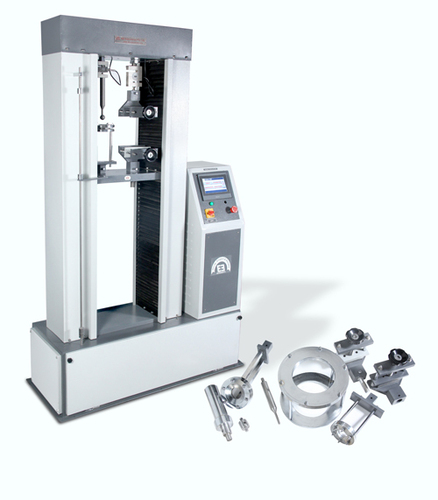

Price:
- 50
- 100
- 200
- 250
- 500
- 1000+
More Products in Civil Testing Instruments Category
Geotextile Permeability Apparatus
Price 1.00 INR / Piece
Minimum Order Quantity : 1 Piece
Features : Stainless steel body, Leakproof design, Userfriendly digital controls
Usage : Civil Testing Instruments
Application : These test methods cover procedures for determining the hydraulic conductivity (water permeability) of GeoTextiles in terms of permittivity under standard testing conditions, in the uncompressed state.
Automation Grade : Semiautomatic
UNCONFINED COMPRESSION TESTER WITH PROVING RING and DIAL GAUGE
Price 1.00 INR / Piece
Minimum Order Quantity : 1 Piece
Features : Robust construction, portable, easy loading application, low maintenance
Usage : Rock Testing Equipment
Application : This equipment is used for determining unconfined compressive strength of intact rock core specimens.
Automation Grade : Manual
DIRECT SHEAR APPARATUS HAND OPERATED
Price 1.00 INR / Piece
Minimum Order Quantity : 1 Piece
Features : Sturdy construction, removable shear box, high accuracy, compact manual device
Usage : Rock Testing Equipment
Application : The equipment is used for Direct Shear Laboratory Test of Rock Samples. The test measures peak & residual Direct Shear Strength as a function of stress normal to the sheared plane. The equipment can be used for testing Core, Lump specimens.
Automation Grade : Manual
ASPHALT MIXER-THEORETICAL DENSITY METER-WITH VACUUM PUMP
Price 1.00 INR / Piece
Minimum Order Quantity : 1 Piece
Features : Integrated vacuum pump, Desiccator included, Clear viewing chamber, Removable vacuum gauge
Usage : Civil Engineering, Road Construction Quality Control
Application : Measurement of theoretical maximum specific gravity of asphalt mixtures
Automation Grade : Semiautomatic
 |
EIE INSTRUMENTS PVT. LTD.
All Rights Reserved.(Terms of Use) Developed and Managed by Infocom Network Private Limited. |

 Send Inquiry
Send Inquiry
